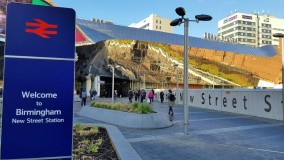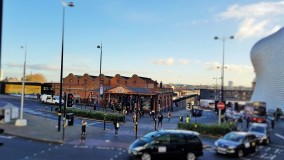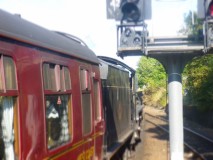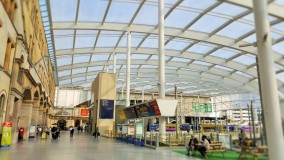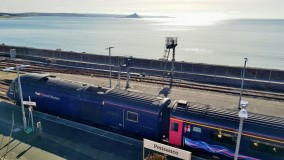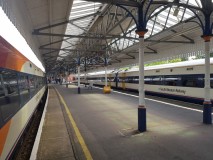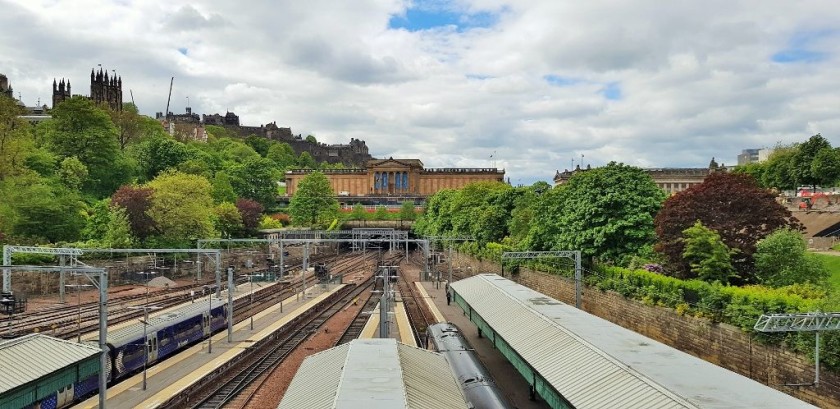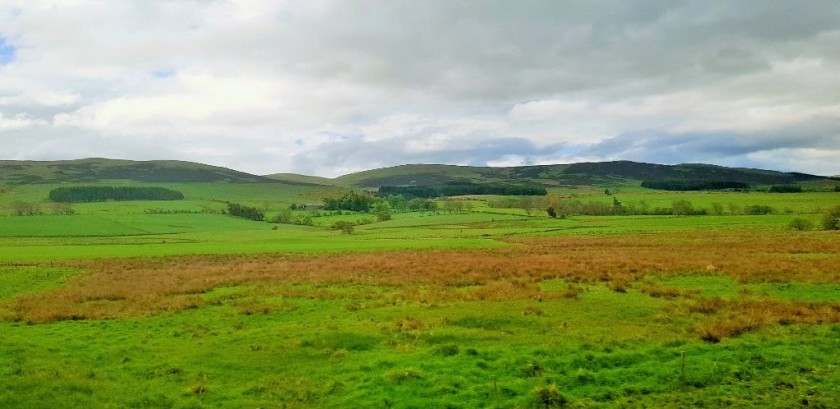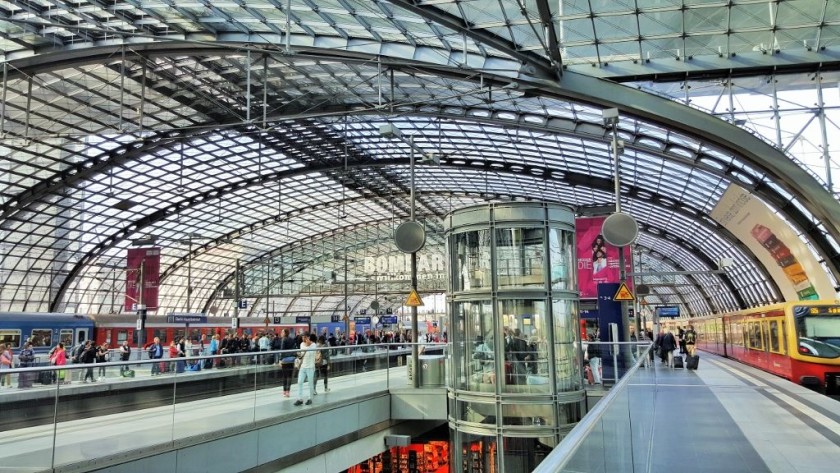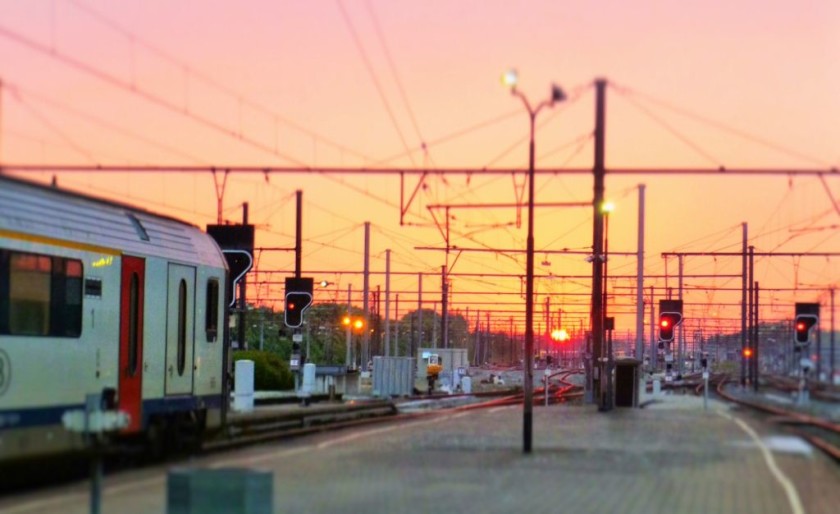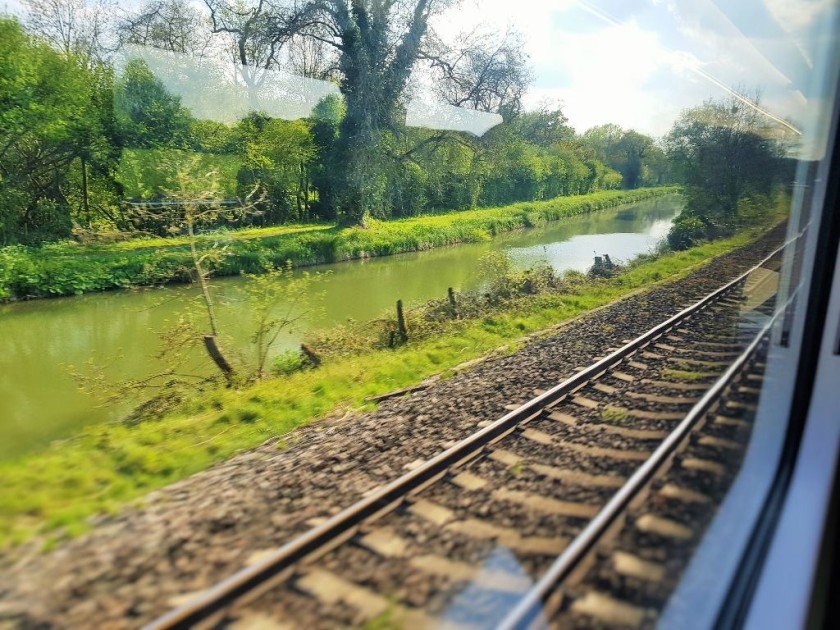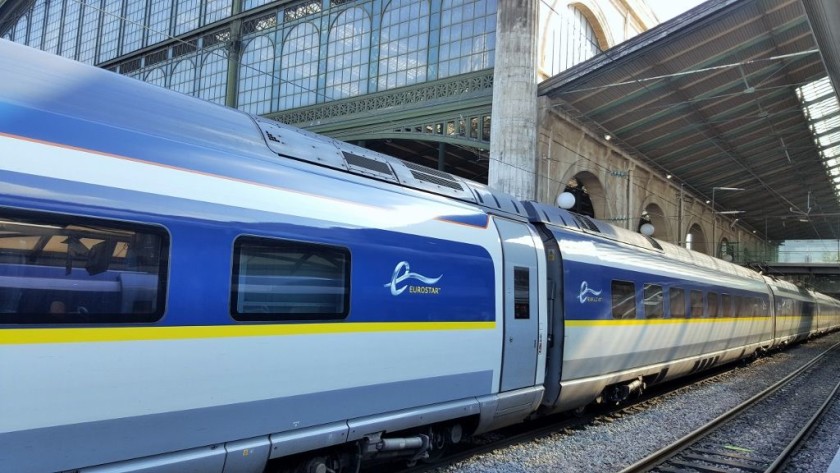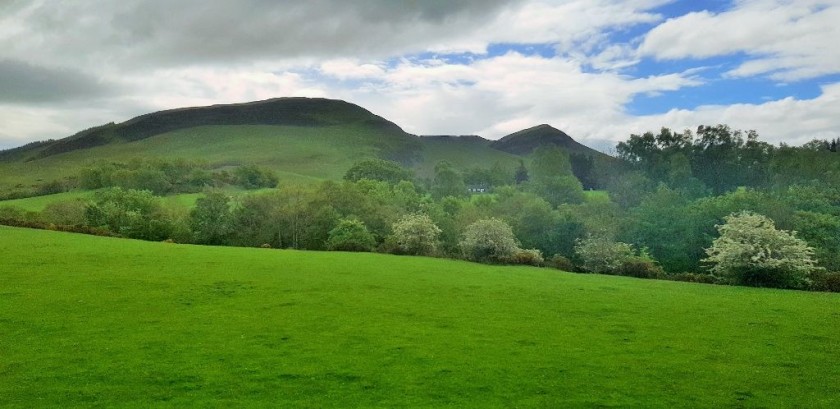Related Content
Content

Great Britain
Welcome to our guide to traveling in Great Britain by train; it should save you time money and confusion!
Share
Helpful links:
How to travel by train in Great Britain:
There are many unique aspects to travelling by train in Great Britain, but more often than not, what are now typical aspects of taking a European train journey apply.
If you want to save money on a one-way long distance journey, then the start-to-finish steps of looking up a journey and booking it online, aren't particularly unusual.
So if you book ahead you can often obtain a cheaper price, but then have to stick by the terms of the type of ticket you have chosen.
What can make planning train journeys in England, Scotland and Wales a tad bewildering are the multiple methods of saving money, which you may, or may not come across; particularly when making a return journey.
You may be offered a choice of different ticket types, prices or train services, depending on the journey you will be taking.
Something exceptional that does need explaining is the use of Great Britain as the country name in place of United Kingdom, as well as the references to British trains and tickets across SMTJ.
It's because train services in Northern Ireland are both managed separately and linked to the rail network of The Republic of Ireland, so they will be included when we add The Republic Of Ireland to ShowMeTheJourney.
Covid 19 Travel Info:
This is the Coronavirus information posted by National Rail.
Here are the links to the Coronavirus information pages which have been published by these train operators - many of these new pages now have details of changes to train schedules, or give access to revised timetables,
Northern l Scotrail
Note that wearing face masks on trains remains mandatory in Scotland
National train services
Approximately 80-90% of long-distance services are currently operating to the usual pre-pandemic timetable
The notable exceptions are:
- London to Birmingham New Street and Manchester Piccadilly services are available 2 x per hour instead of 3 x per hour.
- Most London<> Newcastle services remain suspended with the station calls being picked up by revised London <> Edinburgh services.
- On the Edinburgh Waverley <> Glasgow Queen St fast route via Falkirk, 2 x trains per hour are available instead of 4 x trains per hour
- The Liverpool to Edinburgh via Manchester and Leeds service is only operating between Liverpool and Newcastle.
- The Liverpool <> Scarborough service is only operating between York and Scarborough.
- The Manchester Airport <> Newcastle via Manchester and Leeds service is suspended but the hourly Manchester Airport <> Redcar service is still operating, which covers most of its station calls.
- Avanti West Coast has suspended its services between Birmingham and Glasgow.
Eurostar services
Eurostarservice is operating only around 40% of its usual timetable.
No Eurostar services will be calling at Ebbsfleet International or Ashford International until at least the summer of 2022.


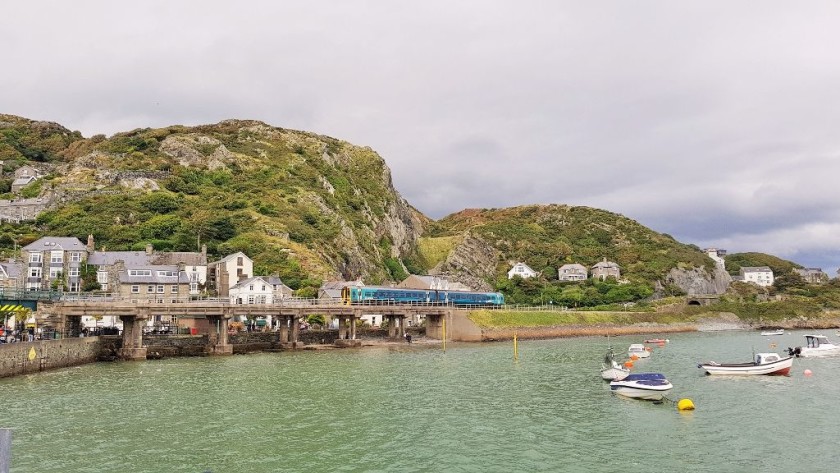
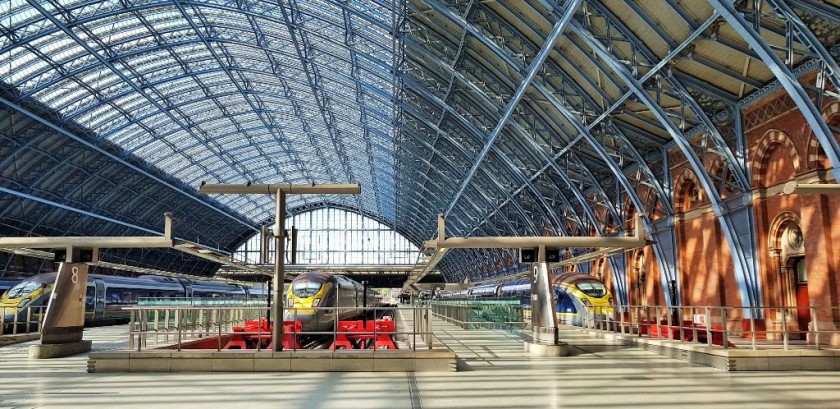




Why the train operators matter:
Every European country takes a unique approach to how it operates its train services, but the core difference with Great Britain’s (England, Scotland and Wales) rail network is the lack of a dominant national rail operator.
Instead a multitude of private operators provide the train services, with each separate Train Operating Company (TOC) being responsible for its own network.
And two or more companies can provide the train service between cities.
Which company (TOC) is providing the train service on a route impacts on both the ticketing and the journey experience.
That's because each specific TOC manages how its tickets will be sold, such as the types of ticket which will be available to purchase on each specific departure.
They also have the freedom to set the service levels provided to passengers on the trains, including which catering facilities will and won't be available and how the Wi-fi access will be managed.




When travelling by train:
The rail network is centrally managed by National Rail and its website is a great resource for planning journeys, looking up general ticket and national rail pass info and checking whether maintenance works will be impacting on the route you will be travelling by.
It’s also a central resource for information and booking of mobility services for those that require additional assistance.
Frequency:
Long distance train services are more frequent in Great Britain than any other country in Europe.
Many long distance routes between London and other major cities have 2 x trains per hour throughout the day, some have three!
When travelling between cities other than London, a minimum of an hourly service of express trains is the norm, some shorter distances routes such as Leeds <> Manchester and Edinburgh <> Glasgow have 4 x trains per hour!
Though on some routes fewer trains operate at weekends; particularly on Sundays, and journey times can be longer at weekends too.
Recent improvements:
One of the most unusual aspects of travelling by train in Britain is the breadth of the different types of train used to provide the services across the country.
Each TOC is responsible for its own fleet and buys trains to meet its needs, so more than 35 different types of train are used nationally.
Though normally only one, or occasionally two, types of train are used on each specific route; though that is changing temporarily because new trains are gradually being introduced on many routes.
(There's still many more trains to be added to SMTJ, so the Trains links on the Content menu doesn't yet provide a fully comprehensive list).
That's because long-distance train travel in Britain is in the midst of being transformed, because brand new trains have either recently entered service, or will soon be introduced on a swathe of routes across the country.
Shorter distance train travel has also been transformed for the better, particularly across northern England, because the notorious 'Pacer' trains, which were in effect buses on rails, have now been replaced.
Information on board:
In the coaches of most trains used in Britain there will be electronic information showing the calling points of the train, which is worth checking to see if the station you're heading to is the next calling point; the automated announcements which will say "this train is now arriving at..." usually occur only around a minute before the train will get to a station.
This destination info is usually all that's available on the info screens on British trains, info such as details of onward connections, where the trains is and the speed of the train, isn't shown.
So if you will be making an onward connection it can be worth asking the conductor, for the time and platform number of any subsequent train you will be taking.
The seat reservation info
Because seat reservations are optional on British trains, systems have to be used to inform passengers without reservations which seats are available.
Therefore information for reservations is assigned to each specific seat; on newer trains this is shown electronically, with the info being above the train windows, but on older trains paper cards are inserted into the back of the seats
So if you have a reservation, the usual procedure is that you find your seat number(s) which will be on your reservation or ticket, the info on the train will confirm that this is the seat you have been assigned.
If you don't have a reservation then blank electronic displays or no cards on the seat backs, are indicators of available seats.
However, on busy trains it's worth checking the info displayed for each reservation, because the stations between which the seat has been reserved for, will be shown.
For example, you may be travelling from London to York and the reservation info for a specific seat may show that it has been reserved for travel between York and Edinburgh, but as you will only be travelling as far as York, you can occupy this seat.
Notes on stations:




Outside of London most cities only have one major stations; the main exceptions are Glasgow and Manchester.
Until recently British stations didn't have any information which informed travellers of where to wait on a platform (track) for easy boarding into coaches in which reserved seats are located.
The platforms/tracks at British stations still aren’t usually divided into zones, as obviously as they are in France and Germany.
Instead the platforms (tracks) at many large stations, at which trains call at during a journey, now have comparatively small signs spaced along the platform, which show the coach numbers of the trains; usually the trains heading to and from London.
It's also a good idea to pay close attention to the information screens on the platforms (tracks) as many of them now show a lot more information than the destination and time of the next departure; they often now also tell travellers where to wait on the platform if you have a reservation.
On long distance trains heading away from London, the First Class coaches are usually at the rear of the train, when heading to London, they’re usually at the front.
Trains very rarely reverse directions at stations in Britain during their journeys, so if you prefer to face forwards, you will usually be facing that way for the entire trip.
The three major exceptions are:
- Manchester <> Bristol/Exeter trains reverse direction at Birmingham.
- Newcastle <> Southampton services reverse direction in both Birmingham and Reading.
- Manchester <> Bournemouth services reverse direction at Reading.
Finding your train:

A train numbering system in which every individual train is given a specific code isn't used in Great Britain, so there isn't, for example, a train 5743 to Edinburgh which is also calling in York. Therefore in Britain the departure time is the key piece of information, which specifies the train you will be travelling by.
So if you will be travelling to York with a seat reservation on the 11:30 train from London Kings Cross, the key piece of information on your reservation is the departure time.
When you're at King's Cross station you can look for which train you will be boarding on the main departure board.
You would be looking for the train leaving at 11:30, it's final destination will be Edinburgh, but beneath its destination, all of the other stations the train will be calling, at will be listed.
One of these other stations will be York, so this 11:30 train to Edinburgh, is also the train to York.
Therefore the train departures are arranged in vertical columns of lists of the stations that each departure will be calling at.
As each train departs, the columns shift to the left, because they are shown in departure order from left to right.
Top right on each column will be the platform (track) number, but when each departure is initially listed, it will often be blanked out.
So you'll know which departure you will be taking because you'll have matched your destination to the departure time, but you won't know, yet, which platform it will be leaving from.
You need to keep an eye on the departure board, because at some point the platform number will appear and it won't usually be announced; only untypical information is usually announced at stations.
On the platform
On the platforms at non-terminus stations, the departure info will also list all of the stations that the next train to depart will be calling at.
Though this info can be shown as scrolling text; this text is worth watching closely as it can also covey additional info other than the calling points.
Taking time out to check all of the info on the platform departure screens is recommended, particularly when travelling long-distance.
As explained above, you can often use the info to work out where to wait for boarding into the coaches in which your reserved seats will be located, but other useful info, not usually shown on the main departure boards, can include the scheduled arrival time at each calling point.
First Class travel:
Many train operating companies offer First Class long distance ticket holders complimentary food/drink ranging from snacks to a particularly generous full meal service; particularly when travelling on Monday – Friday.
Avanti West Coast and LNER offer particularly good First Class benefits.
First Class ticket holders can also access the First Class lounges provided at MOST stations by the train operating company that they will be travelling by.
However, First Class is not available on some fairly lengthy regional express services, including those operated by, Northern, Transport For Wales and ScotRail.
Assisted travel:
Each Train Operating Company offers a specific MOBILITY ASSISTANCE services and details of how to book Assisted Travel can be found on these links below:
Avanti West Coast l Chiltern Railways l Cross Country l EMR l Grand Central l Great Northern l Great Western Railway l Greater Anglia l Heathrow Express l London North Western Railway l LNER l Northern l Scotrail l Southern l Southeastern l South Western Railway l TFW l Thameslink l Trans Pennine Express l
Works on the line:
Works on the railway lines tend to be carried out at weekends and when they are occurring, buses are often used as substitutes for the train services:
You can check which works are being carried out on all railway lines here.
When looking up tickets/journeys on the TOC's websites, it may not be particularly clear that works are being carried out on your travel dates.
Although if you’re only offered journeys with more changes than our journey summaries suggest, or the journeys are much longer, or Advance tickets aren't being made available on specific dates; it usually indicates that works are being carried out.
Bicycles on trains:
No charges apply when taking a standard non-folding bicycle on any British train - bike tickets aren't required.
However, each train operating company (TOC) has its own bicycle policy – only folding bikes may be allowed on some services/departures.
Certain Train Operating Companies including...
Avanti West Coast l Cross Country l EMR l Great Western Railway l Greater Anglia l LNER l Scotrail l South Western Railway l TFW l Trans Pennine Express
....request or insist that spaces for NON-FOLDING bikes are reserved before boarding on some or all departures; but there is rarely a charge for arranging this.
(Those links above go direct to the bike reservation/info pages for each company).
10 Most Scenic Journeys
The scenic sections of the journey are shown by the arrows:
- Glasgow - Dalmuir > Arrochar > Fort William > Mallaig
- Leeds - Skipton > Settle > Carlisle
- Exeter > Totness - Plymouth > Lostwithel (Cornwall)
- Inverness > Kyle of Lochalsh
- Machynlleth > Pwllheli
- Newcastle - Morpeth > Berwick upon Tweed > Dunbar - Edinburgh > Kirkcaldy > Dundee > Stonehaven > Aberdeen
- Lancaster > Carlisle > Carstairs - Glasgow and Edinburgh
- Edinburgh > Kirkcaldy > Perth > Inverness
- St Erth > St Ives
- Swansea > Llanelli > Llandrindod > Craven Arms - Shrewsbury




Notes on the ticketing:
One of the not particularly unusual aspects of booking train tickets for British train journeys is that there are general nationwide terms for how tickets are sold; at most stations you can pick up a National Rail ticketing guide, which explains what they are.
For example, the names of the three main types of tickets sold are Advance, Off-Peak and Anytime, regardless of which website is selling the ticket, or which company is operating the train you will be travelling by.
However, the TOCs (Train Operating Companies) have the freedom to market tickets for the services they manage and the routes they operate.
So for example, they may not offer Advance tickets on all or any of their routes, or can offer cheaper Off-Peak tickets at particularly quiet travel times.
Therefore the information below is very much a general guide and refers to the most typical scenarios, travellers will encounter when booking and using tickets on British train journeys.
12 Things Worth Knowing:
Most train operators have temporarily changed aspects of their specific ticketing policies in response to the pandemic.
Though when travelling long-distance the typical scenario is that you will still save money by booking Advance tickets ahead of the travel date.
(1) 'Advance' tickets live up to their name, because you'll need to book this type of ticket ahead of your travel date or time, but you will save money, as this type of ticket is discounted.
Avanti West Coast, CrossCountry, EMR, Great Western, LNER, and TransPennine Express are among the Train Operating Companies which offer particularly large discounts on Advance tickets.
In contrast the two other key types of British train ticket - 'Off-Peak' and 'Anytime' aren't typically discounted if you book ahead.
More info is available on our in-depth guide to British train tickets.
(2) If you’re travelling LONG DISTANCE avoid buying tickets last minute AT THE STATION; as only the more expensive Off-Peak or Anytime tickets will be available.
During peak business hours when Mondays - Fridays are working days, Anytime tickets can be more than 5 x more expensive than the most heavily discounted price of the Advance tickets.
If you will be travelling long-distance by Avanti West Coast, CrossCountry, Grand Central, Greater Anglia, LNER, Northern and TransPennine Express, you can now also obtain discounted Advance tickets online on the day of travel.
They'll be more expensive than booking Advance tickets ahead, but will be cheaper than buying last minute tickets at the station.
(3) Because peak business hours have such a significant impact on prices when Mondays to Fridays are working days, if you travel at weekends or on national holidays, on most routes there will be a much wider choice of departures with tickets at cheaper prices.
(4) The further ahead you book, the bigger the savings, because the most heavily discounted Advance tickets inevitably sell out faster.
Tickets are typically placed on sale 12 weeks ahead of the travel date, though the discounted Advance tickets may only be placed on sale 10 - 11 weeks ahead.
(5) There can be big price differences between departures on your travel dates – the cheapest Advance tickets sell out fastest on the most popular trains.
(6) However, if your journey involves changing trains AND using more than one Train Operating Company, then it can be cheaper to book separate tickets for each part of the journey operated by each company - in the UK this is known as Split Ticketing.
(7) There are four different types of online services which sell tickets for British train journeys:
- The TOCs will sell tickets on their respective websites, most of them sell tickets for nationwide journeys, regardless of whether they operate the trains on those routes.
- National Rail is the organisation which manages the railway network and its ticketing service will connect you with the website of the TOC providing the train service on the route you will be taking.
- Independent ticket agents, which sell tickets for nationwide journeys, regardless of which TOCs will be operating the trains.
- Other independent ticket agents, which specialise in split-ticketing.
(8) What can be particularly bewildering are the multiple options, which can be available for booking return (two-way) journeys.
The means of saving money can vary between travelling each way with Advance tickets, booking 'Open Return' or 'Day Return' tickets, or booking a different type of ticket for each direction of travel.
(9) On most services and routes you will have a choice of travelling First Class or Standard Class; the latter is the equivalent of Second class.
(10) CHILDREN aged 5 – 15 travel at a 50% discount on any UK train.
Those aged 4 and under can travel for free when accompanied by an adult ticket holder.
Though the terms for those 4 and under can vary between the Train Operating Companies re: how many infants can travel with an adult and whether those 4 and under have to travel in your lap.
(11) Up to two dogs per passenger can travel for free too.
(12) For those aged 60 and over, discounts are available when using a special railcard that both UK and visiting seniors can purchase (UK residents can buy this online or at station, but visitors need to purchase the card at a station).
When there is a choice of companies:
When travelling between some towns and cities multiple Train Operating Companies (TOCs) can provide the train service.
These TOCs can share a route, or take different routes between stations.
This can impact on tickets on how tickets can be purchased and used, depending on;
- whether the trains will be taking the same or different routes,
- whether you book ahead online,
- if you'll be booking last minute at the station,
- how far you will be travelling.
How seat reservations are managed:
To ensure social distancing, on all long-distance train services, the operators of train services on which reservations are typically available, have temporarily introduced their own amended specific seat reservation policies.
There is no national standard for this, so before booking and travelling it can be worth checking the current policy of the company you will be travelling by.
The links to the respective policies are available on this guide to UK train operators, on which you can also check which company will be operating the train that you will most likely be travelling by.
It's worth doing so, as the temporary policies range from seat reservations being mandatory, meaning that seats will be assigned when booking any type of ticket, to seat reservations being suspended so that when boarding, passengers can choose between distanced seats, which are clearly marked as being available for travel.
Seat reservations are another aspect of British train travel, which is managed differently, compared to what's typical in Europe.
Therefore the TEN things most worth knowing about seat reservations on British trains are:
(1) Seat reservations are NOT usually mandatory on any British daytime train service - so you don't have to make reservations if you will be travelling with a rail pass such as a Britrail or Eurail pass, or if you will be using any type of 'Rover' ticket.
The exceptions when reservations are mandatory include a few summer Saturday express trains to Devon and Cornwall; and reservations are also required on The Night Riviera and Caledonian Sleeper services.
(2) Avanti West Coast, CrossCountry, EMR, Great Western, Hull Trains, LNER, ScotRail and TransPennine Express are the TOCs Train Operating Companies which make seat reservations available for long-distance journeys.
Greater Anglia also offers seat reservations on its London <> Norwich route.
(3) Reservations are automatically included when booking Advance tickets for journeys by those eight TOCs (train operating companies), because you need to travel by the specific departure(s) you selected when booking, in order to use that type of ticket
Seats are also assigned when booking Advance tickets for the longer-distance routes operated by London North Western Railway and South Western Railway
(4) If you book Anytime or Off-Peak tickets on the longer-distance routes operated by Avanti West Coast, CrossCountry, EMR, Great Western, Hull Trains, LNER, ScotRail and TransPennine Express and on the London <> Norwich route, seat reservations won't automatically be included,
That's because the usual key selling point of these two types of ticket, is the freedom they typically provide of being able to choose between departures.
Book these two types of ticket for journeys by those companies and you can OPT to add a complimentary reservation, either when booking the ticket online, or later.
(5) However, the time limit for booking reservations at stations is usually 1- 4 hours ahead of travel; the time limit depends on the TOC providing the train service you will be travelling by.
So if you will be departing the following morning, you will usually need to book reservations by the end of the previous day.
Keep this is mind if you will be using a rail pass, such as a Britrail Pass OR a EURAIL pass, because it typically won't be possible to book reservations at a station, just prior to boarding.
Though when using rail passes you won't be charged for booking reservations at stations, but you will need to use a staffed ticket desk and not a ticket machine.
(6) The need to book reservations ahead, is why they are NOT typically available when booking walk-up Anytime or Off-Peak tickets at stations, just prior to boarding.
(7) On services/routes on which seat reservations are an option, information for whether each specific seat has been reserved or is available, is typically displayed on board the trains.
(8) You won't usually have to travel in the seat(s) you have been assigned for your ticket to be valid.
So if alternative seats are available for your journey, you can sit in those instead.
(9) Reservations aren’t always available at all on some fairly lengthy regional services, particularly those operated by Northern AND on most 'commuter' routes to and from London - including trains operated by Chiltern Railways, Southeastern, Southern, South Western Railway and Thameslink.
(10) Despite the comparatively high frequency of departures, British trains can be overcrowded.
Therefore when reservations aren't available, try to avoid travelling into any major city between 08:00 and 09:30 and away from them between 17:00 and 19:00.
Also try to avoid travelling on long-distance train services, on which reservations aren't available, on any route at these times;
- between 15:00 and 20:00 on Fridays and Sundays,
- on routes to/from coastal resorts on summer Saturdays.
Explore stunning Scotland by train
Be inspired and discover how to make the fabulous journeys
Explore beautiful Wales by train
How to experience the coasts and mountains without a car
Holidays by train:
Make going by rail the star attraction of your explorations.
Info to help with Britain's quirky rail system:
Going continental by rail:
Escape from Britain on the train:
Trains






























Cities
Aberdeen
Rail Stations
Aberystwyth
Rail Stations
Bath
Rail Stations
Birmingham
Bournemouth
Rail Stations
Brighton
Rail Stations
Bristol
Rail Stations
Cambridge
Rail Stations
Canterbury
Cardiff
Rail Stations
Coventry
Rail Stations
Dundee
Rail Stations
Edinburgh
Rail Stations
Exeter
Rail Stations
Fort William
Rail Stations
Glasgow
Inverness
Rail Stations
Leeds
Rail Stations
Liverpool
Rail Stations
London
Rail Stations










Manchester
Newcastle
Rail Stations
Oban
Rail Stations
Oxenholme (connect for Windermere)
Rail Stations
Oxford
Rail Stations
Penrith
Rail Stations
Penzance (in Cornwall)
Rail Stations
Perth
Rail Stations
Plymouth
Rail Stations
Portsmouth
Salisbury
Rail Stations
Stirling
Rail Stations
Wemyss Bay (for the Isle of Bute)
Rail Stations
York
Rail Stations
Journeys
# Jump to a cityEdinburgh
Journeys from Edinburgh
Jump to citiesEdinburgh to Birmingham by train
Edinburgh to Bristol by train
Edinburgh to Dundee by train
Edinburgh to Exeter by train
Edinburgh to Glasgow by train
Edinburgh to Inverness by train
Edinburgh to Leeds by train
Edinburgh to Liverpool by train
Edinburgh to London by train
Edinburgh to Manchester by train
Edinburgh to Newcastle by train
Edinburgh to Oxenholme by train
Edinburgh to Penrith by train
Edinburgh to Penzance by train
Edinburgh to Perth by train
Edinburgh to Plymouth by train
Edinburgh to St Andrews by train bus via Leuchars
Edinburgh to Stirling by train
Edinburgh to York by train
Journeys to Edinburgh
Jump to citiesLondon to Edinburgh by train
Glasgow
Journeys from Glasgow
Jump to citiesGlasgow to Ardrossan by train
Glasgow to Birmingham by train
Glasgow to Dundee by train
Glasgow to Edinburgh by train
Glasgow to Fort William by train
Glasgow to Inverness by train
Glasgow to Leeds by train
Glasgow to Liverpool by train
Glasgow to London by train
Glasgow to Manchester by train
Glasgow to Oban by train
Glasgow to Oxenholme by train
Glasgow to Penrith by train
Glasgow to Perth by train
Glasgow to Stirling by train
Glasgow to Wemyss Bay by train
Glasgow to York by train
Journeys to Glasgow
Jump to citiesLondon to Glasgow by train
London
Journeys from London
Jump to citiesLondon to Aberdeen by train
London to Aix - en - Provence by train
London to Amsterdam by train
London to Angers by train
London to Antibes by train
London to Antwerpen / Antwerp / Anvers by train
London to Avignon by train
London to Barcelona by train
London to Basel / Bâle by train
London to Bath by train
London to Berlin by train
London to Béziers / Beziers by train
London to Biarritz by train
London to Birmingham by train
London to Bordeaux by train
London to Bourg-St-Maurice by train
London to Bournemouth by train
London to Brighton by train
London to Bristol by train
London to Brugge / Bruges by train
London to Bruxelles / Brussels by train
London to Cambridge by train
London to Cannes by train
London to Canterbury by train
London to Cardiff by train
London to Den Haag / The Hague by train
London to Dijon by train
London to Dundee by train
London to Edinburgh by train
London to Exeter by train
London to Fort William by train
London to Frankfurt by train
London to Genève / Geneva by train
London to Gent / Ghent / Gand by train
London to Glasgow by train
London to Hamburg by train
London to Inverness by train
London to Köln / Cologne / Koeln by train
London to Lausanne by train
London to Leeds by train
London to Lille by train
London to Liverpool by train
London to Luxembourg by train
London to Lyon by train
London to Manchester by train
London to Marseille by train
London to Milano / Milan / Mailand by train
London to Montpellier by train
London to München / Munich by train
London to Newcastle by train
London to Nice by train
London to Nîmes / Nimes by train
London to Oxenholme by train
London to Oxford by train
London to Paris by train
London to Penrith by train
London to Penzance by train
London to Perth by train
London to Plymouth by train
London to Portsmouth by train
London to Rennes by train
London to Rotterdam by train
London to Salisbury by train
London to Stirling by train
London to Strasbourg by train
London to Torino / Turin by train
London to Toulouse by train
London to Wien / Vienna by train
London to York by train
London to Zürich / Zurich by train
Journeys to London
Jump to citiesBarcelona to London by train
Basel / Bâle to London by train
Berlin to London by train
Bruxelles / Brussels to London by train
Edinburgh to London by train
Frankfurt to London by train
Genève / Geneva to London by train
Glasgow to London by train
Hamburg to London by train
Köln / Cologne / Koeln to London by train
Lille to London by train
Lyon to London by train
Marseille to London by train
Milano / Milan / Mailand to London by train
München / Munich to London by train
Paris to London by train
Torino / Turin to London by train
Wien / Vienna to London by train
Zürich / Zurich to London by train
See if there’s a unique journey guide for your trip, featuring info on the trains, tickets & stations.

This is one of more than 150 train guides available on ShowMeTheJourney, which will make it easier to take the train journeys you want or need to make. As always, all images were captured on trips taken by ShowMeTheJourney.



















